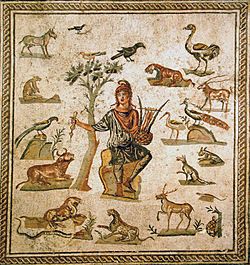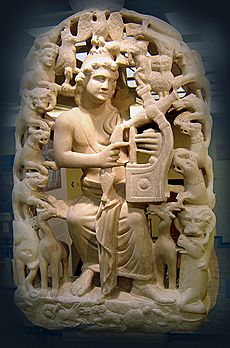Orpheus facts for kids
Quick facts for kids Orpheus |
|
|---|---|

Roman Orpheus mosaic, a very common subject. He wears a Phrygian cap and is surrounded by the animals charmed by lyre-playing
|
|
| Abode | Pimpleia, Pieria |
| Symbol | Lyre |
| Personal information | |
| Born | Pimpleia, Pieria |
| Died | Pangaion Hills, Macedonia, Greece |
| Spouse | Eurydice |
| Children | Musaeus |
| Parents | Oeagrus or Apollo and Calliope |
| Siblings | The Graces, Linus of Thrace |
Orpheus was a legendary musician and poet in Greek mythology. He was so talented that when he played his lyre (a type of harp), even rocks, trees, and wild animals would stop to listen. He was often said to be the son of Apollo (the god of music) or Oeagrus (a Thracian king) and Calliope, one of the Muses (goddesses of inspiration).
Contents
Orpheus's Amazing Music
Orpheus was known for his incredible musical gifts. His music was so beautiful that it could charm anyone or anything. He could make wild beasts calm, trees dance, and rivers change their course. His songs were said to be able to move the hearts of both gods and mortals.
His Adventures with the Argonauts
Orpheus was also a hero who joined Jason and the Argonauts on their quest for the Golden Fleece. His music was very helpful during their journey. For example, when they sailed past the Sirens, whose beautiful but dangerous songs lured sailors to their doom, Orpheus played his lyre so powerfully that he drowned out the Sirens' voices, saving the Argonauts from their spell.
The Story of Orpheus and Eurydice
Orpheus was deeply in love with a beautiful dryad (a tree spirit) named Eurydice. They were married and very happy together.
Eurydice's Tragic Death
One day, Eurydice was walking in a meadow when she was chased by a satyr (a creature that is half-human and half-goat). While trying to escape, she accidentally stepped on a poisonous snake. The snake bit her, and she died, going down to the Underworld, the realm of the dead ruled by Hades and Persephone.
Journey to the Underworld
Orpheus was heartbroken. He played such sad and mournful music that the whole world seemed to cry with him. He decided he couldn't live without Eurydice, so he bravely chose to journey to the dangerous Underworld to try and bring her back.
He used his music to charm his way past the guardians of the Underworld. He played his lyre for Charon, the ferryman of the dead, who allowed him to cross the river Styx. He even lulled Cerberus, the fierce three-headed dog guarding the entrance, to sleep with his melodies.
A Deal with Hades and Persephone
Finally, Orpheus stood before Hades and Persephone, the rulers of the Underworld. He played his lyre for them, and his music was so moving that even the stern Hades and Persephone were touched. They agreed to let Eurydice return to the land of the living, but with one strict condition: Orpheus had to walk ahead of her, and he must not look back at her until they both had completely left the Underworld and reached the sunlight.
The Lost Love
Orpheus began the long journey back, with Eurydice following behind him. He was filled with joy and hope, but also with worry. As he neared the exit, he couldn't hear Eurydice's footsteps and began to doubt if she was still there. Just as he stepped out into the sunlight, he turned around, eager to see her.
But Eurydice was still in the shadows of the Underworld, not yet fully out. Because he looked back too soon, she was pulled back into the realm of the dead forever. Orpheus had lost her a second time, and this time, there was no way to bring her back.
Later Life and Legacy
After losing Eurydice, Orpheus was filled with deep sadness and never loved another. He continued to play his beautiful music, but it often carried a tone of sorrow. His life ended tragically later on.
Orpheus is remembered as one of the greatest musicians and poets in Greek mythology. His story teaches us about the power of love, music, and the consequences of not following instructions.
Images for kids
-
Orpheus (left, with lyre) among the Thracians, from an Attic red-figure bell-krater (c. 440 BC)
-
Nymphs Finding the Head of Orpheus (1900) by John William Waterhouse
See also
 In Spanish: Orfeo para niños
In Spanish: Orfeo para niños






